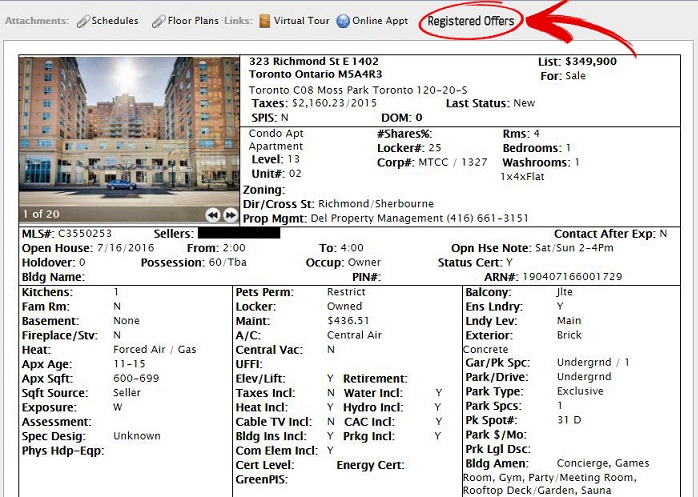How many offers are currently registered on that listing you’re eyeing?
Well unfortunately, you’re never going to know with 100% accuracy.
You can call the brokerage’s front desk, and you can call the listing agent yourself, but you’re never really going to know for sure.
My solution is is not only fail-proof, but it’s incredibly easy to implement. TREB – are you listening?

Form 801.
What a joke.
Have you seen this form? Have you signed it yourself?
A lot of agents just slip it in with the offer and the buyer agency documents, and frankly I don’t blame them.
Why explain something that’s a farce anyways?
Last summer, in response to stories about “phantom offers,” the Ontario Real Estate Association created something called the “Offer Summary Document,” also known as “Form 801.”
The form is to be collected, and kept, for every offer submitted on a property.
But. There’s a but.
If the listing agent instead elects to keep a copy of the offer itself, then the form is not needed.
When this form first made its debut, agents and brokerages were scrambling to try to figure it out, which is quite sad, given the simplicity.
I remember one property I had, where I was the listing agent.
The buyer agent insisted he needed a signed copy of the Form 801, from me!
I told him that’s not how the form worked, and he told me his broker was insisting.
So I simply asked him, “If you can show me on the form where I’m supposed to sign, then I’ll do it.”
That was the end of the conversation.
The whole purpose of the form was to provide an alternative for listing agents who didn’t want to keep a copy of the offer. But given an electronic copy of an offer is, what, 500 KB? And the one-page form is maybe 75 KB? And our hard drives are a goddam terabyte? Who’s worried about the space?
Oh. Wait. I forgot. Some brokerages, and some agents, don’t know what a computer is. They fear having to keep ten pages of paper in a box, for every offer ever submitted, and have to rent a storage space. Right…
Well for those of us who have caught up to 2016, Form 801 is useless.
That’s for us Realtors, of courses.
The real purpose of Form 801, and the requirement to keep copies of every offer ever submitted, is to protect the buyer from phantom offers.
What is a phantom offer, you ask?
Let’s say there’s four offers on a house. What’s to stop the listing agent from saying there are five, and thereby driving up the eventual selling price?
Two years ago, there was nothing to stop that from happening. I don’t believe it happened nearly as frequently as the media would want people to believe, but I’m sure it happened.
Form 801 was supposed to change all that.
There’s just one problem, however, and that’s simply that Form 801 works in a reactive way, not proactive.
If a buyer has a complaint after the deal is done, and the buyer wants RECO to investigate, then RECO can requisition all the Form 801’s, or all the offers. If there were said to be eight offers on a property, and the listing brokerage can produce eight copies of Form 801, eight offers, or a combination of the two, then the brokerage will have shown they worked by the book. If they only produce six, then they’re in trouble.
But the problem with this is that it’s all after the fact.
The deal is done, maybe even closed, and it can’t be undone.
Now it’s up to the buyer to sue the listing brokerage, and/or seller in court.
So what good is Form 801?
Maybe it keeps a few cheating-agents from cheating. But I don’t really think it helps with the offer registry process.
I have a solution, however, and I believe my solution is incredibly easy to implement.
We need an “offer registry system” to track all offers.
And until now, people always thought it should be implemented by the brokerages.
How do you find out how many offers are on a listing? You call the brokerage.
“Hi, can you tell me how many offers are registered on 112 George Street? Great, thanks!”
The receptionist looks at his or her list, and says, “There are…….five.”
But how accurate is that list?
Where is that list, anyways?
Is it in a computer?
Is it on a note pad?
How updated is that list?
What about the one person who rescinded his or her offer?
And what happened when the other receptionist went for lunch, and the part-timer put two of those registered offers, on another listing?
Or what if there is no brokerage?
What if it’s one of those discount brokerages that some of the general public want to deal with? You know – the one who’s “brokerage phone number” goes to some old lady’s cell phone, with a recording that says, “(ahem) Hi…..this is ABC Realty. Please leave a message. BEEEEP!” Then you wonder if you had the right number. Then you leave a message saying you want to book a showing. Then the old lady calls you back a week later and says, “What property was that?” I digress…
What do you do in that case?
Not every brokerage is a full-service brokerage with eight people at front desk.
Not every brokerage is equipped to implement, and correctly oversee an offer registry system.
So we can’t exactly decide to implement an offer registry system, and then give the responsibility to the listing brokerages, can we?
No, we can’t.
But do you know who can implement this?
TREB.
TREB oversees all the MLS listings. Every single one of them, whether it’s Bosley Real Estate, or Old Lady Realty Inc.
Every MLS listing has one thing in common, regardless of who the listing brokerage is: it’s on MLS!
It’s simple.
TREB needs to add a button – one damn button, and one damn feature, to every MLS listing.
It’s so simple. It would look like this:

–
Everything up there is what you see on the broker version of MLS – the Schedules, Floor Plans, Virtual Tour, and Online Appointment, the latter of which, by the way, is a 2-year-old feature that TREB implemented. Now we don’t have to call the listing brokerage to book an appointment like it’s 1996. We click buttons on the “internet.” How novel.
So to the right of that, we have “Registered Offers,” which would be yet another button, and another feature.
The agent would then click on that button, and a new window would open up, that looks like this:

There.
Simple.
There’s six registered offers on the property.
And if you want to register an offer, you click a button, probably one that…..gee……let me think about this……says “REGISTER,” and because you’re logged in to TREB with your own password and ID, it will know who you are, and your offer will be registered under your name.
Voila.
So damn simple.
This will end any and all speculation about how many offers are on a property, and relieve brokerages’ front desks from having to answer, quite often, a hundred calls between 4pm and 7pm on offer night, from people asking, “How many offers are registered on 600 Sutherland Drive?”
Obviously relieving phone calls from a brokerage is not the objective here, but it’s a nice by-product!
The ineffectiveness of the current “system,” that is, having a brokerage or the listing agent keep track in his or her head, or on a piece of paper, or on a computer, is something that varies depending on the brokerage, but will always be inexact, and imperfect.
If TREB were to implement this very simple system, it would be near flawless.
So now to the bigger question: why wouldn’t TREB do this?
I don’t know.
Perhaps they’ve never been asked.
I don’t want to blame them for not doing something if they’ve not been asked.
But I do think that organized real estate needs to be far more proactive, and if somebody said, “Hey TREB, why don’t you implement this offer registry system?” they have no reason not to get the ball rolling tomorrow.
TREB, OREA, and CREA have money.
Look no further than the thousands upon thousands of dollars that OREA collects from each and every wanna-be Realtor in order to get licensed (multiple courses, fees for missed, rescheduled, or failed exams, and then licensing), and you’ll find a multi-million-dollar war-chest that I don’t think OREA has any idea what to do with.
How about being proactive, and implementing some systems that will help bring the industry forward, and gain some public’s trust?
How about trying, for once, to be ahead of the curve, instead of riding behind it?
Check out the new “ASK TRB” section of Toronto Realty Blog. It’s still a work in progress, but one of the questions asked last week was, “What do you think about the realtor.ca app?”
I didn’t pull my punches.
And another reader jumped on and provided his qualms with the site, all of which were great points, and ones that CREA should be addressing.
OREA’s response to the issue of “phantom offers” was a poor one.
The response was to implement a reactive measure, so that if a complaint is launched, they have the paperwork necessary to investigate.
But how about a proactive measure?
An offer registry system, via MLS, is the only measure that will work.
And now that I’ve written this post, which I know will be read by those at all three levels of organized real estate, I’m starting my timer…































jeff316
at 9:10 am
This just sounds like an electronic version of what’s going on now. So, while it will be easier to use (and that in itself might be a rationale for it), I don’t see what outcomes it actually improves, particularly given that the offer process is still largely done by hand and hardcopy.
Ken Davenport
at 1:59 pm
I’ve said the same thing for years.
The only problem with your specific solution is that it’s restricted to TREB members. If you exclude non-TREB member you’re doing a disservice to your client and sooner or later give the Competition Bureau another reason to breath down our necks.
But that should be an easy modification.
West Ender
at 1:59 pm
David, the problem with your idea is simple: It makes too much sense!
Anyone out there who knows how large organizations work these days understands that simplicity is not kosher. Besides, it just might kill the golden goose if all those phantom clients suddenly had real names attached to them.
Greg
at 4:40 pm
Someone’s actually already implemented a whole service for this: https://haus.com/how-it-works
Liz
at 11:19 pm
What about taking your system a step further and having the actual offer amount listed as well? I would be kind of like an online auction system… Curious to hear the pros and cons associated with that.
Samson Yao, Broker of Record, Chairos Properties Inc.
at 12:05 pm
Why not? consumers drives the market.
Samson Yao, Broker of Record, Chairos Properties Inc.
at 12:04 pm
Great idea!